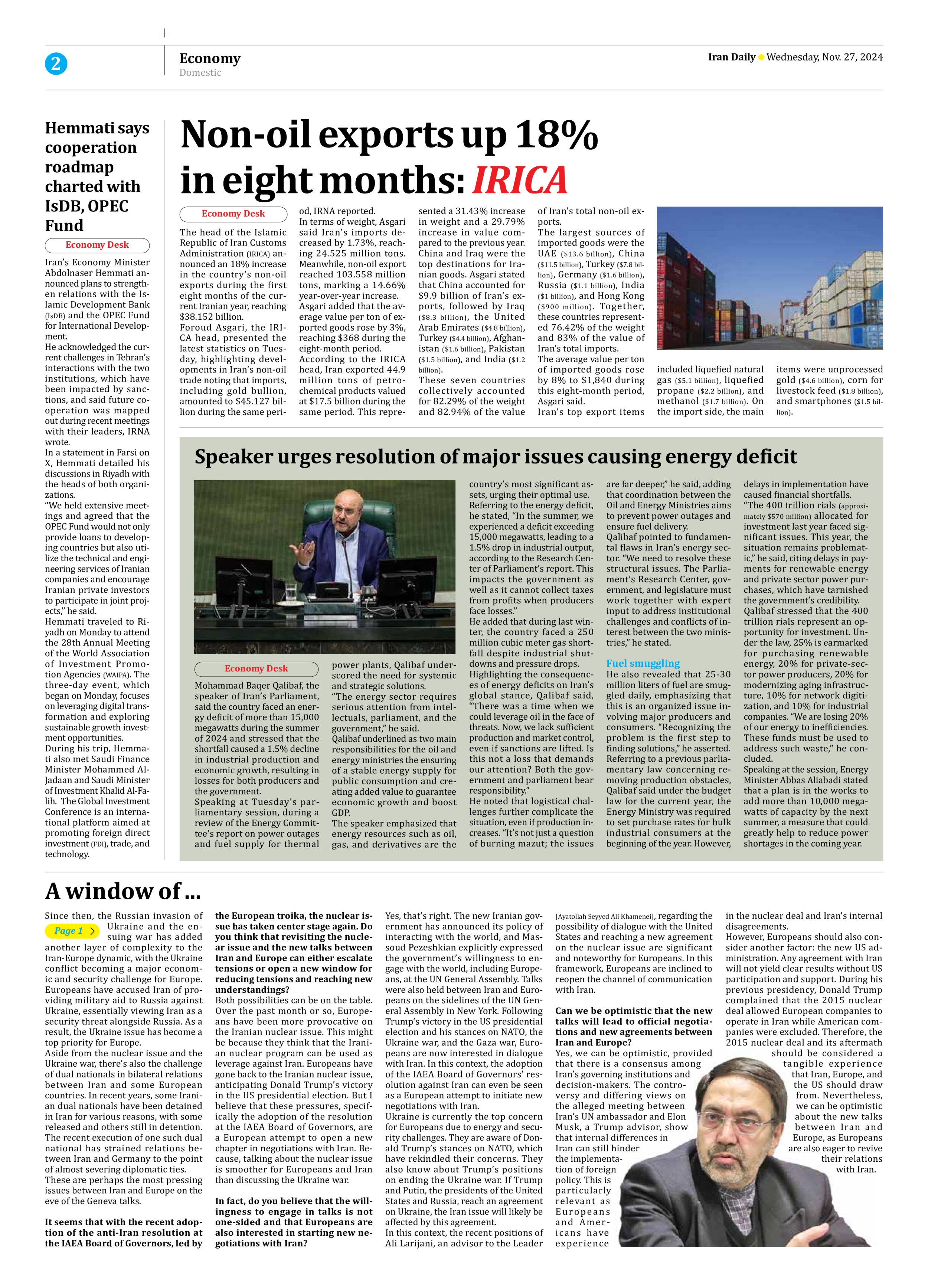
A window of ...
Page 1
Since then, the Russian invasion of Ukraine and the ensuing war has added another layer of complexity to the Iran-Europe dynamic, with the Ukraine conflict becoming a major economic and security challenge for Europe. Europeans have accused Iran of providing military aid to Russia against Ukraine, essentially viewing Iran as a security threat alongside Russia. As a result, the Ukraine issue has become a top priority for Europe.
Aside from the nuclear issue and the Ukraine war, there’s also the challenge of dual nationals in bilateral relations between Iran and some European countries. In recent years, some Iranian dual nationals have been detained in Iran for various reasons, with some released and others still in detention. The recent execution of one such dual national has strained relations between Iran and Germany to the point of almost severing diplomatic ties.
These are perhaps the most pressing issues between Iran and Europe on the eve of the Geneva talks.
It seems that with the recent adoption of the anti-Iran resolution at the IAEA Board of Governors, led by the European troika, the nuclear issue has taken center stage again. Do you think that revisiting the nuclear issue and the new talks between Iran and Europe can either escalate tensions or open a new window for reducing tensions and reaching new understandings?
Both possibilities can be on the table. Over the past month or so, Europeans have been more provocative on the Iranian nuclear issue. This might be because they think that the Iranian nuclear program can be used as leverage against Iran. Europeans have gone back to the Iranian nuclear issue, anticipating Donald Trump’s victory in the US presidential election. But I believe that these pressures, specifically the adoption of the resolution at the IAEA Board of Governors, are a European attempt to open a new chapter in negotiations with Iran. Because, talking about the nuclear issue is smoother for Europeans and Iran than discussing the Ukraine war.
In fact, do you believe that the willingness to engage in talks is not one-sided and that Europeans are also interested in starting new negotiations with Iran?
Yes, that’s right. The new Iranian government has announced its policy of interacting with the world, and Massoud Pezeshkian explicitly expressed the government’s willingness to engage with the world, including Europeans, at the UN General Assembly. Talks were also held between Iran and Europeans on the sidelines of the UN General Assembly in New York. Following Trump’s victory in the US presidential election and his stances on NATO, the Ukraine war, and the Gaza war, Europeans are now interested in dialogue with Iran. In this context, the adoption of the IAEA Board of Governors’ resolution against Iran can even be seen as a European attempt to initiate new negotiations with Iran.
Ukraine is currently the top concern for Europeans due to energy and security challenges. They are aware of Donald Trump’s stances on NATO, which have rekindled their concerns. They also know about Trump’s positions on ending the Ukraine war. If Trump and Putin, the presidents of the United States and Russia, reach an agreement on Ukraine, the Iran issue will likely be affected by this agreement.
In this context, the recent positions of Ali Larijani, an advisor to the Leader [Ayatollah Seyyed Ali Khamenei], regarding the possibility of dialogue with the United States and reaching a new agreement on the nuclear issue are significant and noteworthy for Europeans. In this framework, Europeans are inclined to reopen the channel of communication with Iran.
Can we be optimistic that the new talks will lead to official negotiations and new agreements between Iran and Europe?
Yes, we can be optimistic, provided that there is a consensus among Iran’s governing institutions and decision-makers. The controversy and differing views on the alleged meeting between Iran’s UN ambassador and Elon Musk, a Trump advisor, show that internal differences in Iran can still hinder the implementation of foreign policy. This is particularly relevant as Europeans and Americans have experience in the nuclear deal and Iran’s internal disagreements.
However, Europeans should also consider another factor: the new US administration. Any agreement with Iran will not yield clear results without US participation and support. During his previous presidency, Donald Trump complained that the 2015 nuclear deal allowed European companies to operate in Iran while American companies were excluded. Therefore, the 2015 nuclear deal and its aftermath should be considered a tangible experience that Iran, Europe, and the US should draw from. Nevertheless, we can be optimistic about the new talks between Iran and Europe, as Europeans are also eager to revive their relations with Iran.







